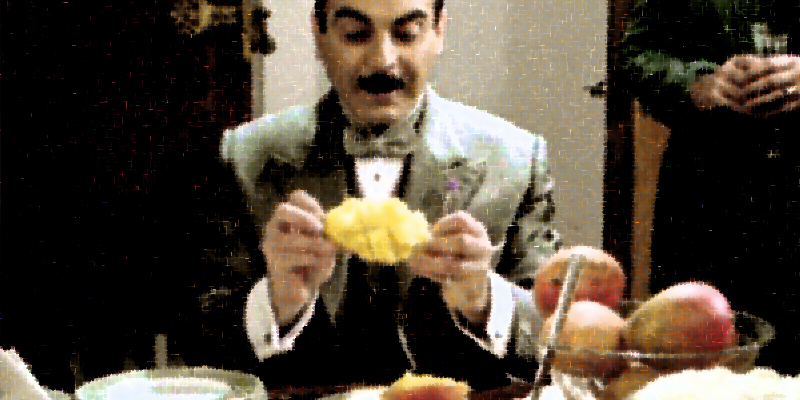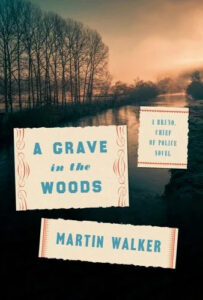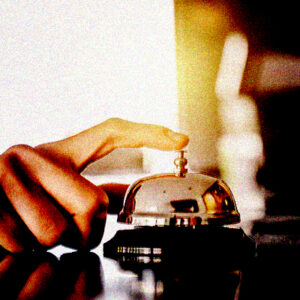One of the pleasures of crime fiction is its realism in sticking so closely to life as most of us know it, which includes the pleasures of the table. Sherlock Holmes enjoyed his oysters with a bottle of white burgundy, and in The Clocks Hercule Poirot says: “A claret or a burgundy introduced into a story, with its vintage and date properly authenticated, I always find pleasing.” Sadly, he neglects to give us the year of the Château Mouton Rothschild he offers to his friend Dr. Burton in the foreword to the The Labours of Hercules.
We know from The Adventure of the Noble Bachelor that Sherlock Holmes also enjoyed his food, since the author tells us ‘A quite epicurean little cold supper was laid out upon Holmes’s table. There were a couple of brace of cold woodcock, a pheasant, a pate de foie gras pie with a group of ancient and cobwebby bottles.’
That combination of foie gras and woodcock, or la bécasse, as the French call it, took me back to a treat that Pierrot, our village policeman who inspired the Bruno stories, prepared for me and two friends. He’d had a good day at the hunt and came back with four woodcocks, the most wily and delicious of game birds.
We have a lovely old open fireplace where Pierrot rigged a wire across the fire irons from which he hung the birds in the traditional way of the Périgord, letting them cook over the embers so that they would roast without burning. When they were almost done, Pierrot let the last of the fat that dripped from each bird fall onto squares of toast covered with foie gras, protected by an iron screen from the direct heat of the embers.
When Pierrot pronounced the birds about to be served, we had the squares of toast topped with foie gras, accompanied by a glass each of the lovely dessert wine of Chateau Monbazillac. Its rich sweetness balanced the fat in the foie and cleansed our palates for Pierrot’s masterpiece, the roast woodcock. This more than lived up to its promise, as we raised each bird to our lips by the beak, and proceeded to eat everything except the beak itself. For the wine we shared a magnum of 2003 Pécharment from Chateau de Tiregand.
It was an experience that made me think that maybe in some alternate universe we might be able to throw a dinner party for my favorite heroes and heroines of crime fiction. The woodcock and foie gras for Sherlock Holmes would be the main course, but we would need other courses, starting with the noted epicure Nero Wolfe and his famous dish, Trout Montana,
We would first gut the trout and then lay thin slices of ham, about the width of the fish, on four squares of metal foil. Next we should sprinkle a little brown sugar, some chopped onion and a few drops of Worcestershire sauce on the ham and then place each fish on top, still with head and tail attached. We should then add salt, repeat the sprinkling of brown sugar and Worcester sauce, wrap each fish in foil and lay them on the darkening embers of a wood fire. With this we should enjoy a bottle of a wonderfully crisp Bergerac white, the cuvée Quercus from Ch la Vieille Bergerie.
So, that was the two primary courses settled, the trout to start followed by the woodcock, doubtless to be relished by Nero Wolfe and Sherlock Holmes. But what of the lesser courses? And would not Sherlock and Nero want some fellow crime heroes to attend? In the back of my mind, I could hear Philip Marlowe In The Long Goodbye, being brutal about ‘one of those mixed-up salads which men will eat with complete docility in restaurants, although they would probably start yelling if their wives tried to feed them one at home.’
So I would throw together a winter salad from the garden, using some frisée lettuce, sliced endives, arugula and chopped walnuts, with a dressing of lemon juice and walnut oil. We’d call it Mean Streets salad and hope that would pass muster with Marlowe, of whom his creator wrote, ‘Down these mean streets a man must go who is not himself mean, who is neither tarnished nor afraid…’
The dessert would be for Agatha Christie to decide, and we know that she loved fresh figs, and anything that came with sufficient amounts of Devonshire potted cream. “She used to drink cream from a huge cup with ‘Don’t be greedy’ written on the side, an injunction she never showed any sign of obeying,” her grandson Matthew recalled.
But fresh figs in winter would not pass muster so instead we will serve Miss Marples’s speciality, apple pie with meringue, to be served with a glass of Rosette from Chateau le Rooy. Rosette is a semi-sweet white wine unique to the Bergerac region, with barely a score of vineyards still producing it, and all the more precious for that.
The final course of cheese would be chosen by Bruno’s fellow countryman, Commissaire Maigret himself, taking leave to join us from his office at 36 Quai des Orfèvres in Paris. Just as he did when dining with his wife at a favorite bistro on the Rue de la Grande-Armée (in Maigret se Défend), Maigrey chooses Brie de Meaux, the most popular of France’s soft cheeses.
But what does that leave for another favorite, Dorothy L. Sayers, creator of Lord Peter Wimsey and stalwart of The Detection Club? No more courses at dinner spring to mind, but that does leave her favourite meal, breakfast, to be served the next morning. As she noted in Unnatural Death: ‘What? Sunday morning in an English family and no sausages? God bless my soul, what’s the world coming to, eh? And as she reminded us in Busman’s Holiday, ‘I have never regretted Paradise Lost since I discovered that it contained no eggs-and-bacon.’
After all, it was another British author, Somerset Maugham, who said ‘If you want to eat well in England, have breakfast three times a day.’
***


















